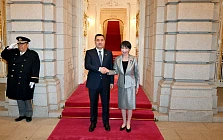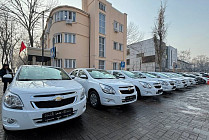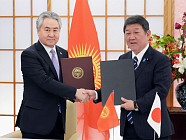Falling ruble will not get kyrgyz migrants back home from Russia
As survey shows that most of migrants (80%) send money home in rubles and just about 20% - in dollars. And falling rate of ruble to som has not affected the preferences of our migrants.
According to them, Kyrgyzstan is still unable to provide people with jobs, and given falling rate of ruble, it is hard to find a job with such a salary in Kyrgyzstan.
Recall in Moscow labor migrants in service sector make about 25 thousand rubles per month.
As chairman of board «Association of kyrgyz-businessmen» Kubanychbek Kozhoev noted, today Kyrgyzstan can not host and provide 100-thousand army of labor migrants with jobs.
«This (crisis - KyrTAG) is of a temporary nature. Those kyrgyzstanis, who, due to the crisis, returned home, after a month had to come back to Russia. Because there are no such opportunities at home which Russia has. Of course, it may last three, or six months as maximum. But all should sense, that all this is taking place over macroeconomic situation unfurling in the world», - he said.
Furthermore, Kozhoev noted, as predictions say, after Kyrgyzstan joins Customs Union the number of labor migration will grow significantly, 10-20% as minimum.
Head of public organisation «Movement of labor migrants of Kyrgyzstan in Russia» Alisher Madanbekov asserts that, now migrants go not home, but to other foreign countries.
«Long-lasting crisis may lead to outflow of migrants fr om big cities of Russia. For instance, high qualified specialists – doctors, engineers, teachers are already seeking for favorable areas, where the dollar affects less economy of that country. For example, there have been pioneers who left for South Korea, Turkey, arabian countries and Europe», - he said.
Alisher Madanbekov noted, that in this case the goverment should develop a special program for entrepreneurs, who intend to move out their businesses from Russia.
«During a long term crisis, as many experts say, kyrgyz goverment should work out its own monetary policy to shore up small business. To help fellow-countrymen not move their businesses out of Russia to foreign countries, and start to bring their business to Kyrgyzstan», - he added.
As labor migrants say themselves, those professions, they acquired in Russia are not in demand in Kyrgyzstan.
For example, Uran Mamatsheraliev who works as a sushi master at a japanese restaurant in Moscow says that he can not find such a job in Kyrgyzstan.
«We have (in Kyryzstan - KyrTAG) very few japanese restaurants. I want to say that over the last times our countrymen have started to work in better paid jobs. For instance, most of Moscow’s japanese restaurants employ kyrgyz nationals. Wh ere will they find jobs in Kyrgyzstan? So, despite the crisis they will be working here anyway», - he said.
Gulzada Akmatova, saleswoman at a flower-shop, says, that many migrants will have to return.
«I and my aquaintances are mulling about returning to Kyrgyzstan. One must sense, that it is getting more and more expensive to live in Moscow. Lodging and food are getting costly every day, furthermore the ruble is falling and equaling with the som», - she grumbled.
Meantime russian experts are optimistic. Some leading analysts are sure that in the first quarter of 2015 ruble will regain its previous state and will total 38.7 per US dollar. On the contrary western analysts prognosticate pessimistic forecast, talking about long term crisis in Russia and CIS countries.
According to experts of leading banks of the West and USA, the crisis will heavily weigh on not only Russia, but also first Tajikistan, Kyrgyzstan, Moldova, Armenia, Georgia, Bosnia and Herzegovina, Albania, Ukraine and Macedonia.
How true the forecasts of experts, will show the time. Now millions of Kyrgyzstanis are wating, waiting with hopes for the better future off Russia. Because the homeland, Kyrgyzstan is not yet rea dy to host 100 thousand army of migrants.


